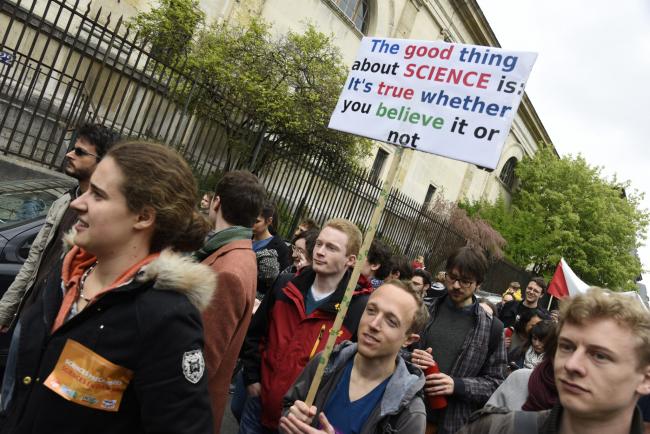Articles Menu

June 10, 2022
A team of researchers and environmental advocates are urging governments and Big Tech companies to do far more to stop rampant online disinformation campaigns, which they say aim to delay action on the climate crisis by intentionally dragging the issue into the culture wars now dominating Western politics. Failing to stop such campaigns, the groups warned in a new report, could further splinter unity at November’s climate talks and jeopardize a global effort that has struggled to slash planet-warming emissions.
“Whether through conspiracies like ‘climate lockdown,’ or by conflating climate with divisive issues like critical race theory, LGBTQ+ rights and abortion access, the goal of much climate change disinformation is now to distract and delay,” wrote the authors of the report, released Thursday by a broad coalition of climate and social media watchdog groups. “Given that the window to act is brief and rapidly closing, this approach could have devastating consequences.”
The report, which analyzed hundreds of thousands of social media posts over the last 18 months, found that despite promises from tech companies in recent years to crack down on the spread of “fake news” on their platforms, posts with misleading or false information about climate change continue to flourish online. It also found that much of the disinformation is coming from a small group of actors who wield a large sphere of influence online and have found success in sowing doubt over the urgency of global warming by tapping into populist sentiments such as distrust in scientific experts and wealthy elites, as well as a nationalistic and isolationist view of global politics.
For example, the analysis found 6,262 Facebook posts and 72,356 tweets where users blamed other countries for climate change while deflecting the responsibility of their own country. Posts from Western countries tended to highlight the shortcomings of China and India, claiming they were not doing enough so there was no point in anyone acting. The study also found 115,830 tweets and 15,443 Facebook posts that called into question—often inaccurately—the viability and effectiveness of renewable energy technologies.
To mitigate the problem, the report’s authors recommend that governments, as well as appropriate international bodies, formally recognize the threat of “climate disinformation,” adopt a universal definition for it and pass policies—such as the European Union’s Digital Services Act—that limit the legal immunity social media companies have when it comes to what their users post on their platforms.
The report also called on Big Tech companies to implement several changes to better prevent climate disinformation on their platforms. Those included implementing policies that restrict misleading advertisements and punish repeat offenders for spreading false information with their products and services, as well as adopting clearer definitions in their user terms of service agreements when it comes to climate disinformation
Social media companies have come under increasing scrutiny for their role in the spread of false or misleading information online, and Thursday’s report is the latest in a growing body of evidence that suggests the problem is only getting worse. One analysis found that Americans consumed twice as much news from “unreliable” sources in 2020 as they did in 2019, for example. Another study found that false information spreads faster online than accurate information, with falsehoods being 70 percent more likely to be retweeted on Twitter than the truth.
Thursday’s analysis also highlights how issues targeted by disinformation campaigns, such as climate change, are becoming increasingly polarized in the wake of the pandemic. In 2020, President Trump often downplayed the scientific advice from his own staff, helping to fuel conspiracy theories and general distrust in science. And in 2021 and 2022, inaccurate information on social media contributed to growing public backlash against the vaccines and mask mandates that were often promoted by Democratic leaders who were following advice from the medical community.
Many social media platforms have promised to crack down on both misinformation and disinformation amid growing public pressure to address them. Misinformation refers to the spread of inaccurate knowledge unknowingly, while disinformation refers to the explicit spread of lies. Last year, Facebook CEO Mark Zuckerberg acknowledged that climate disinformation was “a big issue” on the platform and established the Climate Science Center as a way to promote scientifically accurate information. And in April, Twitter announced it would no longer allow advertisers on its site who deny the scientific consensus on climate change, following a similar move by Google back in October.
But Thursday’s report said that not only were those efforts not working, but that the platforms appear to be actively amplifying the inaccurate messages, which in the last 18 months alone reached “millions of people worldwide” and were “bolstered by legacy print, broadcast and radio outlets.”
Many climate activists worry that without strong intervention, online disinformation will only continue to undermine the ability of world governments to pass their own climate legislation, let alone cooperate effectively under an international agreement.
“We will not be able to stop climate change if all conversations are flooded with disinformation,” Michael Khoo, who specializes in climate change and disinformation and is a member of the coalition that released Thursday’s report, told Newsweek. “Governments must require social media companies to be transparent and accountable about the harms their products create, as they do with every other industry from airlines to cars to food processing. We should not continue this endless game of climate denial.”
[Top photo: PARIS, FRANCE - APRIL 22: As part of a global movement March for Science protesters march to demonstrate on April 22, 2017 in Paris to oppose Trump’s rejection of science, climate change, global warming and the rise of misinformation. (Photo by John van Hasselt/Corbis via Getty Images)]